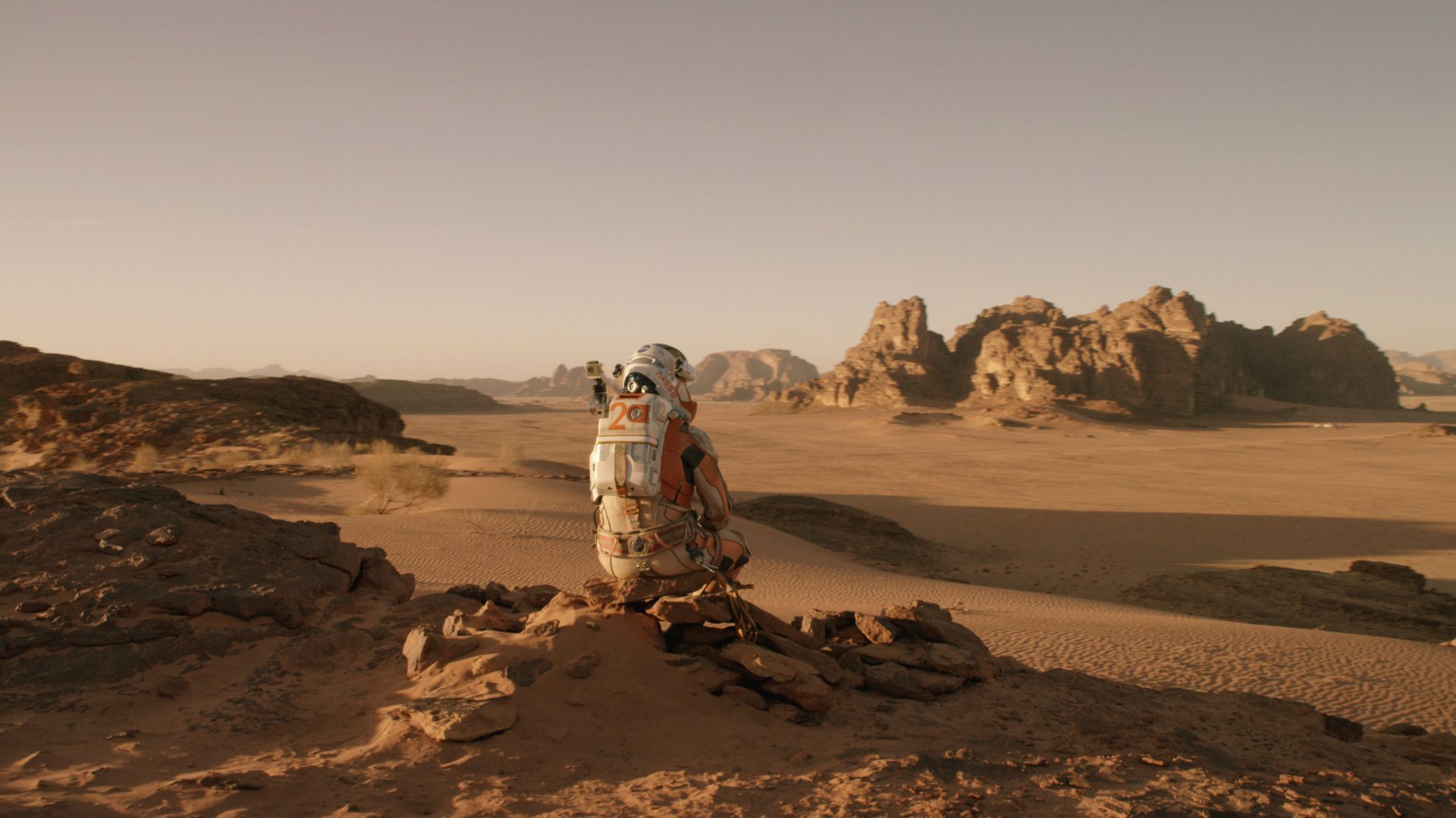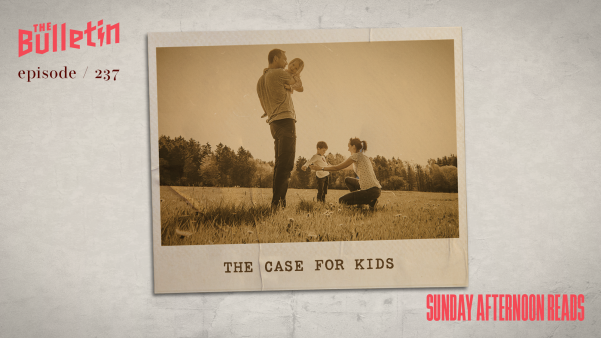Fall has arrived at last, and with it, our now-annual space blockbuster, destined to spark as many thinkpieces and “What This Movie Gets Wrong About Science Stuff” explainers as 2013's installment (Gravity) and last year's (Interstellar). The Martian, directed by Ridley Scott and based on the first self-published and now bestselling novel by Andy Weir, is probably the most enjoyable of the three, if not the most fantastical. This is the most practical and down-to-earth (haha) of the trio, without all the relentless visual metaphors of Gravity or the mind- and time-bending theoretical physics of Interstellar.
Matt Damon stars as Mark Watney, a member of a six-person mission to Mars helmed by Commander Lewis (Jessica Chastain) who gets left behind on Mars when the crew has to abandon the planet suddenly. Watney, the crew's botanist, has to figure out how to communicate with earth and survive on a barren planet, while NASA and a herd of scientists scramble back on Earth to figure out how they might bring him home.
Weir's novel is not great literature, though it's certainly a fun read (the fact that I read it during a recent hospital stay, while hooked up to beeping machines and an oxygen tube may have helped enhance its appeal—I'm fine now, thanks for asking). The film is that rare case in which the problems with the original when read by a general audience—its sometimes overlong science-y explanations, its occasionally clunky narratorial shifts—are almost all ironed out of the on-screen adaptation, without losing the flavor of the original.
This is still a very nerdy movie, with lots of botany and physics and “we ran the numbers and it checks out,” but most of the book's wonkiness is ironed out in favor of moving the story along more pleasingly for the science-allergic. Similarly, the main narrative conceit of the book, Watney's written diary, is converted into video updates, which makes for a much more visually appealing film and gives us the pleasure of watching Matt Damon joke around.
And part of what makes the book so enjoyable is Watney's wry sense of humor in the midst of his mad scramble to save his own life; thankfully, Damon sticks every joke, provoking audible laughter from the audience in my screening. It's the rare sci-fi film that is funny from start to finish without being a parody (certainly neither Gravity nor Interstellar left anyone giggling). Fans of the book will probably enjoy the film just fine, but those who haven't read it will be able to follow along just fine, too.
Technically this is science fiction, I suppose—it is presumably set in the near future, since there are manned missions to Mars, something we're not doing yet. But the film, to its credit, feels no need to wow us with futuristic gadgets on the Earth side of things. Probably the filmmakers recognized that everything NASA does feels futuristic enough to us normals. Even the phones look basically like the iPhone I'm carrying around in my pocket which, by the way, would have blown the minds of moviegoers a decade ago.
The landscape of Mars itself is shot gorgeously (and, I am sure, CGI-ed within an inch of its life), evoking for all the world the hellswept landscape of the other great imaginative blockbuster so far this year—the marvelous Mad Max: Fury Road. When I first noticed the likeness, I brushed it off, but it's actually worth considering: there could not be two more different visions of the future than these films.
Because really, this is an action film in space, an adventure movie set against the stars. And like a lot of action blockbusters, it's basically optimistic. In a blockbuster world ruled by dystopias and conspiracies and shadowy bureaucracies, The Martian's cheerful attitude about the general decentness of people comes across as almost a throwback. Unlike nearly every sci-fi film of the recent past, The Martian doesn't spend any time wondering if humanity deserves to survive. It takes it for granted that we do, as long as we can figure out the mathematical equation that will help us do so. We survive because we solve problems, and we work together to do so, sometimes even with people whom politicians might tell us are our sworn enemies.
In this way, The Martian functions almost perfectly as an antipolitical film, one that sidesteps the power plays you might expect as much as possible in favor of pretty good people with good humanity-loving motives helping one another out in an attempt to bring an astronaut home. There's no villain in this film, except maybe the landscape of Mars, but the film doesn't take as much of a man-against-nature stance as others in the genre. Even the people who disagree do it because they have good motives. The public relations folks, who would be easy to demonize, are just doing their best. Different departments figure out how to work together. The final shots of the film reinforce this, showing groups of people around the world with sizable ideological differences all pulling for Watney.
Given all this, it's remarkable that the film works as well as it does. Who ever heard of an action film without a villain? How can everyone be a hero?
There's an answer buried in the film, though you have to be paying attention to notice it. Because The Martian gives us this picture of humanity, it does a curious thing: it also calls into question the whole reason for space travel. Historically, though the “space race” was intended for scientific exploration, when its details reached the general public, they were used for more political motives—to prop up patriotism and prove that we're number one. That impulse meant enormous amounts of taxpayer dollars to be poured into NASA projects.
But today, in a globalized world where nation-state borders are getting increasingly fuzzy, that kind of patriotism comes across as almost gauche. What The Martian gives us is one vision of the future of space travel, one that does it—as a number of characters put it throughout the film—so that we can be connected to something “bigger than ourselves.”
Watney speaks of this several times, once suggesting it's almost worth being stranded on the planet for the beauty he gets to see every day. That beauty is worth dying for. It's bigger than the individual—which is just another way of saying it transcends one person's concerns. With repeated sequences that show just how many players are involved in the bring-him-home effort, The Martian neatly bucks Team Great Man and comes down on the side of Team Teamwork, which can never be a bad thing.
And that beauty is linked with scientific exploration and MacGyveresque problem-solving ninja skills, which means that when the credits roll, The Martian is both entertaining and an oddly effective infomercial for STEM education.
Its perspective is a pretty balanced one, though: science exists to solve problems, and also to let us observe the beauty of the universe. That dual purpose resonates in a world full of debates over whether the sciences or the humanities are more important. It's a silly argument, because they need each other.
If twentieth century space exploration was about patriotism, then, maybe twenty-first century space exploration is just about assuring ourselves that we're all human, and that there is something we're living for that's bigger than our own small, petty concerns. In the Age of Outrage, a world where we tend to ignore or dehumanize people who aren't like us, that might not be a terrible thing.
Caveat Spectator
If you're okay with some peril and salty language, The Martian is just about right for older teens and adults, and maybe some science-obsessed younger teens as well. The f-word gets a fair amount of play, sometimes to lighten the mood and sometimes because some people would presumably resort to bad words when they think they might die alone on an empty planet. The s-word is used both to denote unhappines and actual excrement. That's about the extent of the profanity, though it's frequent enough that parents might wince with younger children. There's also a little blood, particularly in the beginning, when Watney is forced to perform surgery on himself to remove a bit of metal from his abdomen. And obviously, there are explosions and more than a few moments where someone might die, which could be frightening to younger audiences. Finally, there's a short, non-sexual shot of rear Damon nudity, intended to show the audience the extent of what Watney's body has had to endure.
Alissa Wilkinson is Christianity Today's chief film critic and an assistant professor of English and humanities at The King's College in New York City. She has nightmares about space travel, which are actively encouraged by Hollywood blockbusters, and tweets @alissamarie.









